Minimum Wage In Iran Only Enough For Nine Days: Official
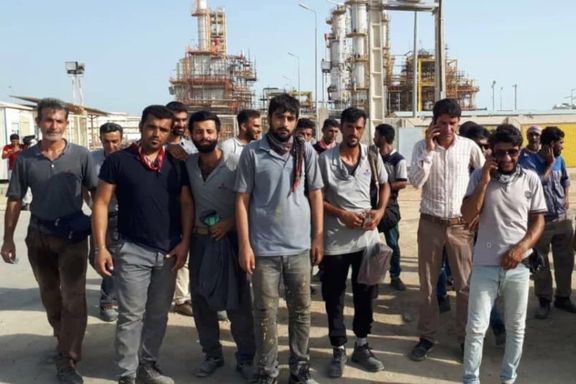
Amid widespread labor protests in Iran, an official says the monthly minimum wage of less than $200 only suffices for "nine days of a family's life".

Amid widespread labor protests in Iran, an official says the monthly minimum wage of less than $200 only suffices for "nine days of a family's life".
Hossein Rasouli, an official from the Workers’ House said Saturday that currently, the minimum monthly wage of workers does not even reach eighty million rials (150 USD).
Although the government mandated wage is called the "minimum" wage but that is what most workers receive.
“The wages of the workers have increased by only 27% this year, but this increase is for those workers who are formally employed and does not include a large part of [temporary or contract] workers,” he underlined.
Earlier, the Coordinating Council of Teachers Associations said to prevent further impoverishment of the lower-class wages must be determined in US dollars.
Real incomes in Iran began to lag behind inflation after the establishment of the Islamic Republic in 1979, but salaries were increasing from 2000-2010 when monthly minimum wage hit a high of about $275 in 2010. This coincided with the time when the United Nations Security Council began imposing sanctions to force Tehran to roll back its nuclear program.
A few months into the presidency of Ebrahim Raisi, when inflation was around 40 percent, the High Council of Labor increased the minimum wage by an unprecedented 57 percent in early 2022 after two consecutive years of very high inflation. At the time minimum wage almost equaled $220.
However, the rial lost half of its value in the past 8 months and the minimum wage, without housing allowance, has dropped to around $120 a month.
Rising prices and declining incomes have led to more protests in the previous months with thousands of workers still on strike.
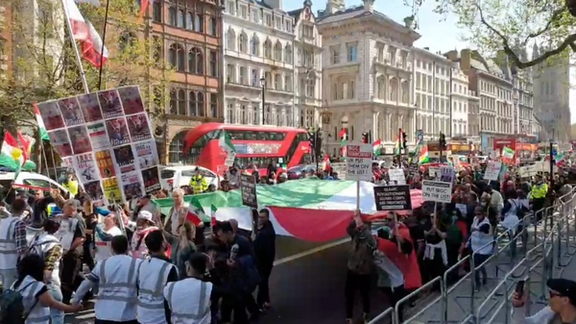
Thousands of Iranians marched in London to 10 Dawning Street Saturday to ask the UK to proscribe Iran's Revolutionary Guards (IRGC) as a terrorist organization.
The protest rally was attended by activist Vahid Beheshti who has been on a hunger strike in London since February 23 outside the UK Foreign Office to raise awareness for the need to designate the IRGC.
In a speech, the 45-year-old Beheshti encouraged the Iranian opposition to foster solidarity. “They managed to strike us with dynamite in the past four months but let’s resume [our unity] from here, from London,” he said referring to the recent disputes among opposition groups and figures.
Activist Hamed Esmaeilion who resigned from the Alliance for Freedom and Democracy in Iranlast week also attended the rally and, in a speech, accused the IRGC of destroying Iran’s economy, environment and the future of all Iranians.
“Stop denying the truth. This evil entity should not have a place in the future of Iran,” he told western governments, including Britain and the European Union that have been cautious to designate the IRGC for fear of further alienating the regime and in turn harm the prospects of negotiations over its nuclear program.
Esmaeilion also urged Beheshti who is now on day 66 of his hunger strike and in a wheelchair to end his action.
Also attending the rally was Alireza Akhondi, a Swedish-Iranian member of the Swedish Parliament who organized a large protest rally in Strasbourg, France, in January to encourage the European Parliament to designate the IRGC as a terrorist organization.
“IRGC’s revolting crimes are evident. It should be put on the list of terrorist groups the same as Da’ish and the Hezbollah of Lebanon,” Shahran Tabari, an Iranian-British journalist, a member of the Labour Party, and an expert on Iran-UK relationship, told the participants in the rally while stressing that the UK’s recent sanctions against the IRGC were “good but insufficient.”
Protesters chanted slogans such as “IRGC is terrorist”, “Down with the child killing regime” and “Down with the Islamic Republic.”
Several other Iranians have joined Beheshti’s protest action in the past weeks and set up their tents for a sit-in in front of the Foreign Office building.
Beheshti met with Tariq Ahmad, Minister of State for the Middle East, North Africa, and South Asia, at the Foreign Office earlier this week and later said they had discussed the UK’s sanctioning of four more IRGC commanders and the importance of proscribing the IRGC as a terrorist organization.
He had also met with the Minister of State for Security, Tom Tugendhat in March and been visited by MPs including Lord Stuart Polak at his tent.
“The Iranian regime is a dead horse. The UK government must not make a bet on a dead horse and should stand beside the people of Iran,” Beheshti’s wife, Coventry city councillor Mattie Heaven, told the rally.
British-Iranian comedian Omid Jalili also spoke at the rally, demanding the IRGC’s designation by the UK government. “The world will then follow suit,” he said.
Several other gatherings were simultaneously held in other European cities Saturday against the Islamic Republic including in Frankfurt, Germany, where Iranian monarchists gathered together upon a call by Iran's exiled Prince Reza Pahlavi and chanted slogans in his support.
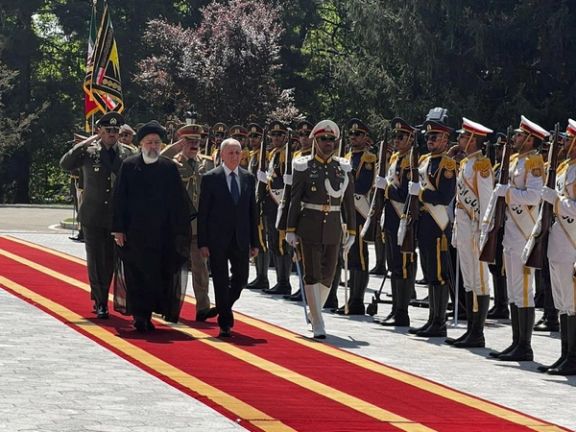
Iran's president Ebrahim Raisi slammed the US presence in the Middle East during the visit of his Iraqi counterpart Abdul Latif Rashid to Tehran on Saturday.
After meeting with Rashid behind closed doors Raisi claimed “the US presence in the region disturbs regional security."
Iraq's president arrived in Tehran along with foreign, water resources, and electricity ministers as well as the national security adviser Saturday morning.
Adding that Americans think about their own interests, not those of the regional countries, Raisi said, "Our relationship with Iraq is based on common interests."
Iran, emboldened by the hasty US withdrawal from Afghanistan in August 2021, has intensified its rhetoric about forcing American troops out of Iraq and Syria.
Referring to the security agreement between the two countries in March Raisi added, “the smallest insecurity in Iraq would be viewed as insecurity in Iran; therefore, Iraq's security is important to Iran.”
Despite the eight-year war between the two neighbors in the 1980s, relations between the Shiite-majority countries have improved significantly since the 2003 invasion which led to the ouster Saddam Hussein.
Raisi further expressed hope that Rashid's visit to Tehran would be "a turning point" in improving ties between the two countries.
With sanctions hitting Iran, Iraq has become one of its major economic lifelines, while Tehran provides Iraq with electricity, gas, and other goods, although US sanctions do not allow Baghdad to make full payments in hard currency that Tehran desperately needs.
This comes as Iran’s financial network in Iraq was bypassing the US sanctions regime at the cost of the Iraqi economy. An informed source in Baghdad told Iran International late in December that Washington has received reports that Iraq is conducting trade with Iran using US dollars despite sanctions.
In early February, Iran International obtained information that revealed some details about the inner workings of a Revolutionary Guard’s Quds force unit tasked with smuggling money from Iraq to Iran. According to the information, the IRGC and the Islamic Republic’s embassy in Iraq were involved in money laundering operations that aim to funnel the regime’s revenues from oil and gas exports back to Iran. As per a repeatedly extended sanctions’ waiver by Washington, Tehran is only allowed to import medicine and some essential goods in exchange for its exports of gas and electricity to its neighboring country.
It is not clear if the issue of Iraq holding more than $11 billion of Iran's money was discussed.
For his part, the Iraqi president said his trip to Iran was intended to expand the already-prospering ties between the two countries.
“Relations between the two countries are coherent and getting stronger, and we must all work to develop them in coordination and continuous cooperation at all levels, including taking into account Iraq’s share of water, especially since most of the tributaries of the Tigris River and Shatt al-Arab originate in the Islamic Republic,” added Iraqi President Abdul Latif Rashid.
There are a number of rivers shared by Iraq and Iran, and access to them has been the source of friction in the past, contributing to the bloody war in the 1980s.
During their joint press conference, Raisi also touched upon the issue saying that “we respect Iraq's right to water according to the agreements signed in the past, and both countries must be committed and adhere to this right so as not to create problems and disruptions.”
Another topic discussed by the two presidents was the drug trade in the Middle East.
“We must cooperate in the fight against drugs, since they have become a cancer that destroys lives,” stressed Rashid.
During the past few years, the sale and use of drugs has increased in the Arab country while Iraqi security forces have intensified their anti-narcotics operations.
Iran is “at the forefront of the fight against drugs,” claimed Raisi, adding that “it is a source of satisfaction that Iraq is also determined in the fight against narcotics.”
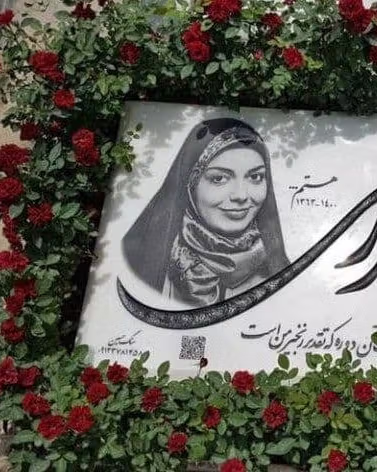
The Iranian regime urged a family to remove the picture of their deceased daughter from the tombstone because it was without a hijab.
The municipality of Kermanshah in western Iran said in a statement that families sign a commitment letter not to put the pictures of women without hijab after their death on the tombstone, “but unfortunately this family did not comply with the regulations and must replace it as soon as possible.”
Last year, Iran started policing the compulsory Islamic dress code – or hijab – on tombstones in the country’s largest cemetery, located in the southern part of the capital Tehran.
The cemetery removed scores of gravestones which had pictures of deceased women without veils.
The director of the Behesht-e Zahra cemetery, Saeed Ghazanfari, had stated that the procedure will continue in the future "in accordance with the opinion of [religious] scholars" until all the gravestones with such pictures are removed.
The Iranian regime has also closed at least 2,000 businesses since late March for female customers or staff refusing to wear compulsory hijab, while tens of thousands have lost their jobs.
On April 25, hardliner media outlets reported that some businesses, mainly restaurants and cafes, owned by celebrity artists and popular footballers have been shut down or received warnings over defiance of hijab rules by their staff and customers.
The recent campaign to enforce hijab rules has caused some violent incidents involving pro-hijab vigilantes and women who defy it.
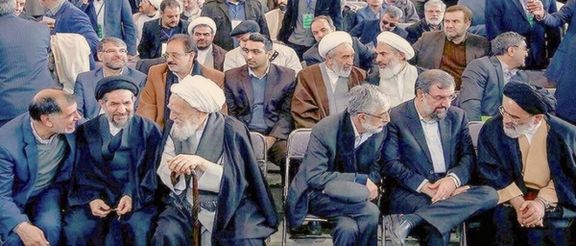
Iran's conservative camp is so divided that it probably cannot be called a "camp" any longer. Gaps have been widening and differences emerging during the past year.
Nonetheless, various conservative groups prepare for the parliamentary election in March 2024 and get together on an almost daily basis, discussing probable alliances.
Divides among conservatives were noted by the media when Majles Speaker Mohammad Bagher Ghalibaf's supporters in February accused the ultraconservative Paydari Party of using the controversy over hijab for political gain as the next election nears.
During the 2020 parliamentary elections, and Presidential election of 2021 conservatives at least pretended to be united in the absence of their reformist rivals.
According to Etemad Online, Conservative figurehead and former Majles Speaker Gholam Ali Haddad Adel warned in March against divides and infighting within the conservative front and suggested that various groups should forget about their differences in the interest of unity of the "revolutionary front."
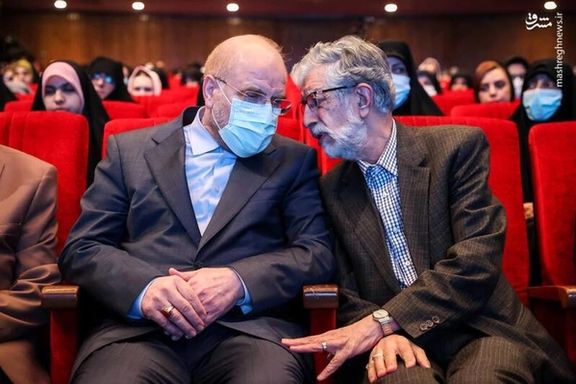
According to the website, when the Society To Promote Popular Institutions of the Islamic Revolution emerged as a conservative alliance in February, it was clearly the same alliance that was called JAMNA (Persian acronym for the Popular Front of Islamic Revolutionary Forces) in 2017, which was led by Haddad Adel.
The alliance was mainly consisting of IRGC-linked Isargaran and Rahpouyan groups. Like 2017, the group once again claimed to be the leading conservative group. Regardless of the word "revolutionary" in its name, the group is a traditional conservative entity. The group's rhetoric, however, looks like the fashionable revolutionary discourse promoted by Paydari, a younger and more aggressive group. Its leading figures are Haddad Adel, Tehran Mayor Alireza Zakani and current lawmaker Zohreh Elahian.
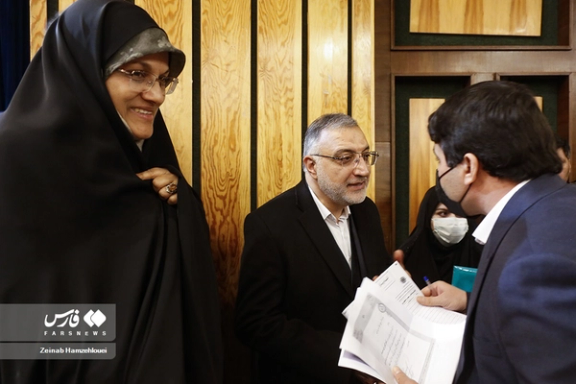
According to Etemad Online, it is evident that decisions about the group and its strategy are made in secret darkrooms rather than transparent congresses. The group is also said to be a rebranded version of SHANA (Coalition Council of Revolutionary Forces), another name for the same group, once again with the code word "revolutionary" which means a group that aligns itself with Khamenei's radical anti-US stance.
However, as a tactic to reduce the significance of Ghalibaf's neo-con allies while giving him prominence as an individual, Haddad Adel is giving the leadership of the group to Ghalibaf, who knows that he has little chance if he remains just as the leader of his neo-con group.
Another conservative group, SHARIAN, the Strategic Network of Supporters of the Islamic Revolution, was established in March with the presence of Vice President Mohammad Mokhber and Roads Minister Mehrdad Bazrpash, firebrand anti-US cleric Mahmoud Nabavian and former hard-line lawmaker Hamid Rasai.
This group's members are known as younger conservatives. Meanwhile, a report in Khabar Online featured photos and a long list of the leading members of the Sharian group mainly to show that they are much younger. The website tagged the next parliamentary election in Iran as a competition between young and old conservatives.
The third group is the notoriously non-conformist Paydari which consists of relatively younger anti-US politicians who have so far defied any alliances in almost every election since 2009. They support a totalitarian Islamic government as opposed to an Islamic Republic which at least pretends to be adhering to some democratic principles. They hold the majority in the current parliament where they ratified reactionary laws against Internet freedom and women's rights.
The group's membership is not transparent. Many members do not openly show affiliation with the Paydari Party, and some others at times distance themselves from the party although it is public knowledge at the parliament that they belong to Paydari.
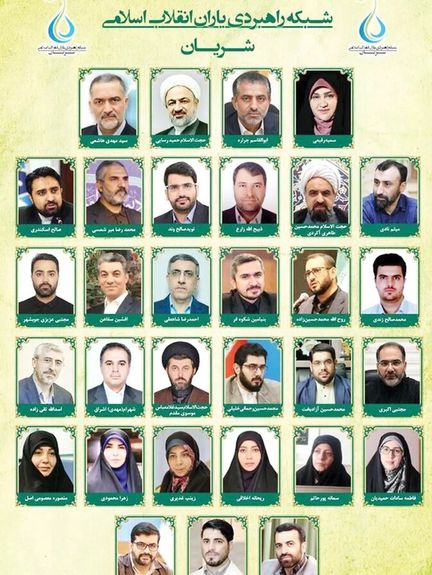
There are also smaller groups such as those who are affiliated with former President Mahmoud Ahmadinejad and the supporters of former Speaker Ali Larijani but they are not big in numbers.
Other groups running for the Majles include traditional parties such as the extremely unpopular Islamic Coalition Party and the allies of former President Hassan Rouhani. The latter group is said to be operating under the leadership of former Interior Minister Abdolreza Rahmani Fazli, a "moderate" politicians who is known for his remarks after the violent crackdown on the 2019 protests: "It is a lie that we only shot the protesters in the head. We shot some in the leg."
However, following the unresolved issues after the 2022 protests, there are every indication that the turnout in the March 2024 could be even less than the elections in 2020 and 2021, which were as low as 20 percent in some big cities.
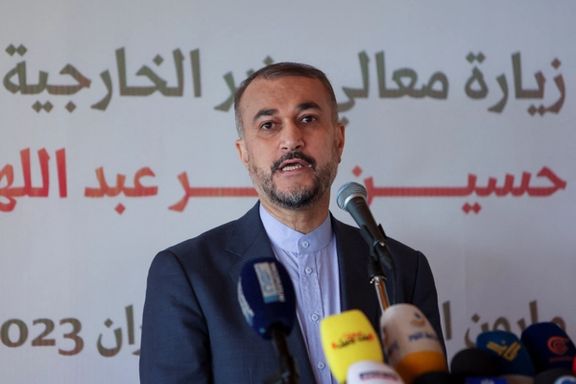
The United States has once again denied a claim by the Iranian foreign minister Hossein Amir-Abdollahian over an agreement regarding the exchange of prisoners.
Amir-Abdollahian, who visited Lebanon on Friday, alleged in a press conference that the Islamic Republic and the United States had agreed to exchange prisoners "13 months ago".
"They introduced an English diplomat lady as a representative. Regarding how to exchange prisoners, an agreement was signed," added Amir-Abdollahian.
However, hours later, the Deputy Spokesperson of the US Ministry of Foreign Affairs said he had no new update to offer in this regard.
“Any comment by Iranian officials …is inaccurate. I would say that most things that come from the Iranian regime I would take with a grain of salt,” Vedant Patel told a press briefing late on Friday.
The Biden administration officials in March also categorically denied Iranian claims that a prisoner swap deal had been reached.
“Statements from Iranian officials that a deal regarding the exchange of prisoners has been reached are another especially cruel lie that only adds to the suffering of their families,” State Department former spokesperson Ned Price told CNN.
A prisoner exchange deal always seemed to be intertwined with a nuclear agreement with the US, but long negotiations in 2021 and 2022 to restore the JCPOA accord limiting Iran's nuclear program failed to reach fruition.
Iran has been accused by Western governments and human rights organizations of detaining Western citizens as hostages to extract concessions.